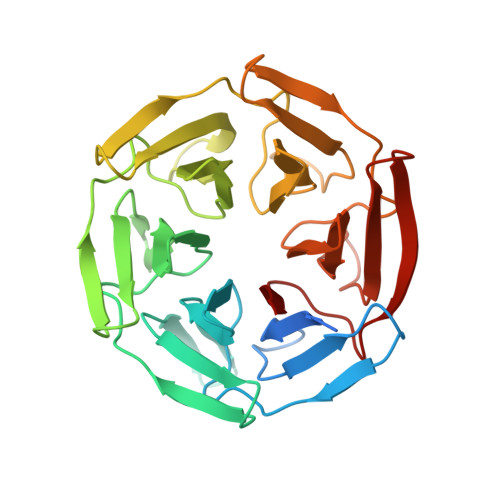p62/Sqstm1 promotes malignancy of HCV-positive hepatocellular carcinoma through Nrf2-dependent metabolic reprogramming
Saito, T., Ichimura, Y., Taguchi, K., Suzuki, T., Mizushima, T., Takagi, K., Hirose, Y., Nagahashi, M., Iso, T., Fukutomi, T., Ohishi, M., Endo, K., Uemura, T., Nishito, Y., Okuda, S., Obata, M., Kouno, T., Imamura, R., Tada, Y., Obata, R., Yasuda, D., Takahashi, K., Fujimura, T., Pi, J., Lee, M.S., Ueno, T., Ohe, T., Mashino, T., Wakai, T., Kojima, H., Okabe, T., Nagano, T., Motohashi, H., Waguri, S., Soga, T., Yamamoto, M., Tanaka, K., Komatsu, M.(2016) Nat Commun 7: 12030-12030
- PubMed: 27345495
- DOI: https://doi.org/10.1038/ncomms12030
- Primary Citation of Related Structures:
4ZY3 - PubMed Abstract:
p62/Sqstm1 is a multifunctional protein involved in cell survival, growth and death, that is degraded by autophagy. Amplification of the p62/Sqstm1 gene, and aberrant accumulation and phosphorylation of p62/Sqstm1, have been implicated in tumour development. Herein, we reveal the molecular mechanism of p62/Sqstm1-dependent malignant progression, and suggest that molecular targeting of p62/Sqstm1 represents a potential chemotherapeutic approach against hepatocellular carcinoma (HCC). Phosphorylation of p62/Sqstm1 at Ser349 directs glucose to the glucuronate pathway, and glutamine towards glutathione synthesis through activation of the transcription factor Nrf2. These changes provide HCC cells with tolerance to anti-cancer drugs and proliferation potency. Phosphorylated p62/Sqstm1 accumulates in tumour regions positive for hepatitis C virus (HCV). An inhibitor of phosphorylated p62-dependent Nrf2 activation suppresses the proliferation and anticancer agent tolerance of HCC. Our data indicate that this Nrf2 inhibitor could be used to make cancer cells less resistant to anticancer drugs, especially in HCV-positive HCC patients.
Organizational Affiliation:
Department of Biochemistry, Niigata University Graduate School of Medical and Dental Sciences, Niigata 951-8510, Japan.
















